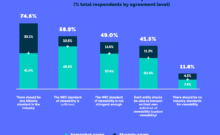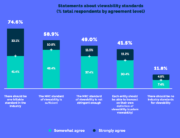Few would argue that the digital ads industry isn’t broken. We’ve come to accept ads as a punishment for using free services, but they’re invasive, annoying, and creepy; they collect too much information, and they can contain malware .
Even the companies running ads on their services know users hate them. Just watch a few videos on YouTube, and you’ll eventually get a message box that encourages you to subscribe to the network’s paid service to get rid of ads.
But users aren’t the only ones complaining. Publishers are also finding ads less profitable; they’re either bombarding their users with more ads or moving toward other methods, such as sponsorship programs and subscription-based business models.
Advertisers, too, are finding the practice increasingly inefficient, forcing them to spend more on ads, a considerable percent of which go to waste. (As a user, I don’t even remember the last time I clicked on an ad in a website or streaming service.)
But this doesn’t mean digital ads are completely dead. A handful of organizations, startups, and large tech companies believe they can fix the problems with blockchain, the distributed ledger technology that underlies digital currencies such as Bitcoin and Ethereum.
In the past year, blockchain has almost become like a hammer searching for a nail—or a marketing term for quick cash grabs. As someone who has been covering the space, I’ve seen companies trying to solve every problem with the internet by (nonsensically) “putting it on the blockchain,” “tokenizing” it, or “decentralizing” it, which are all different ways to say the same thing. Blockchain isn’t the solution to everything.
Read More at The Original Article: www.pcmag.com









